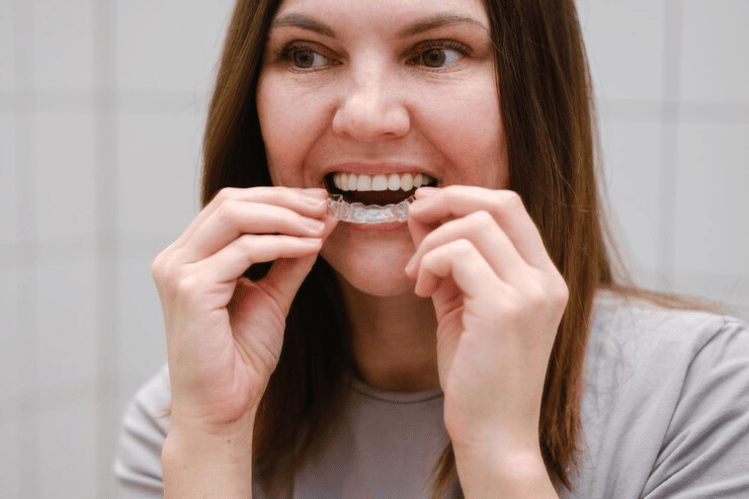
Table of Contents
- What Are Retainers, Why Do They Smell, and What's The Maintenance Checklist For Them?
- Preserving Your Smile's Alignment: The Role and Types of Retainers
- How Do Retainers Work? Exploring Their Role in Orthodontic Treatment
- Why Do Retainers Smell?
- Compliance Is Critical for Retainer Wear
- A Checklist for Retainer Maintenance
- Conclusion
- FAQs
In orthodontic treatment, retainers are an essential part that helps maintain the alignment that is acquired with braces or other correction procedures. But just like any other dental item, retainers need to be properly maintained if you want them to work well and last a long time. One thing that users frequently experience is the formation of disagreeable smells. In this piece, we examine the causes of retainer smells and offer thorough instructions for keeping them in good condition.
Preserving Your Smile's Alignment: The Role and Types of Retainers
We will now learn about the role that retainers play when we are done with our clear aligners treatment. Also, we will look into the different types of retainers in the market.
1. What Are Retainers?
- Definition: Retainers are used to maintain teeth in their correct alignment following orthodontic treatment.
- Customization: Each retainer is made to match the dental needs of the patient precisely.
- Post-Treatment: Retainers are often worn after braces or other orthodontic devices are removed.
2. Why Are Retainers Necessary?
- Preventing Relapse: Teeth often revert to their natural placements following orthodontic treatment.
- Maintaining Outcomes: By keeping the alignment that has been reached, retainers contribute to the treatment's long-term success.
- Stability: Retainers maintain teeth in their new placements by applying mild pressure to the teeth.
3. Types of Retainers
Retainers come in various forms, including.
Hawley Retainers
These are removable metal wires attached to acrylic retainers. They are sturdy and adjustable, so they may be customized to match each patient's unique needs.
Clear Retainers
These clear plastic retainers are less noticeable than traditional wire retainers. They are detachable and provide a covert method of maintaining dental alignment.
Fixed Retainers
Often called bonded or permanent retainers, these are affixed to the rear of the teeth. The patient is unable to remove them and they offer continuous support.
How Do Retainers Work? Exploring Their Role in Orthodontic Treatment
In the field of orthodontics, retainers are essential instruments because they help keep teeth in place after orthodontic treatment is finished. But how precisely do they function? Let's examine the workings of these orthodontic tools.
1. Preserving Alignment
Following orthodontic treatment, which may involve braces, aligners, or other correction procedures, teeth are progressively shifted into the ideal positions. But after the braces or aligners are removed, there's a risk the teeth will revert to their original alignment. Retainers come into play in this situation.
2. Applying Gentle Pressure
Retainer appliances are made to order and are designed to fit tightly over teeth. They use minimal force to prevent the teeth from drifting back into their original alignments. This pressure helps to maintain the orthodontic treatment's integrity and ensures that the results will last over time.
Why Do Retainers Smell?
1. Bacteria Buildup
When bacteria naturally proliferate on surfaces, including retaining surfaces, they become bacteria. This may generate odors if it is not completely cleansed. Cleaning must be done frequently to prevent the growth of bacteria and the resulting odor.
2. Food Particles
Retainers, especially the nooks and crannies, offer the ideal environment for food particles to get lodged. Food fragments that become stuck on the retainer give bacteria the perfect environment to flourish. As these particles decompose, they aid in the creation of disagreeable smells. Thorough cleanup after meals can help prevent this issue.
3. Bad Oral Hygiene
There's more to maintaining oral health than just brushing and flossing. It also involves cleaning orthodontic appliances regularly, including retainers. Odors are produced by the accumulation of trash and germs in retainers due to improper cleaning. Neglected oral hygiene procedures may exacerbate these odor issues, affecting not just the retainer but also overall oral health.
Compliance Is Critical for Retainer Wear
Retainers are an essential component of orthodontic therapy, but patient compliance is what makes them effective. The reasons it's so important to follow the orthodontist's directions when using retainers are as follows.
1. Regularity
Following the orthodontist's recommendations for retainer wear is crucial. Consistency is key to ensuring that the teeth remain in their newly positioned alignments. Inconsistent retainer use or skipping might cause unwanted movement and negate the benefits of orthodontic treatment.
2. Adaptation Period
Patients may initially experience discomfort when wearing retainers, particularly if they are not accustomed to wearing orthodontic appliances. Still, you must endure this phase of change and adhere to wearing schedules. The majority of patients eventually become accustomed to wearing retainers, and any initial discomfort disappears. For the treatment to be effective during this adaptation phase, it must be worn consistently.
3. Extended-Term Dedication
It takes consistent effort over time to keep orthodontic treatment's benefits. Similarly, to prevent relapse and ensure that the teeth remain straight and in the proper alignment throughout time, it is essential to wear retainers as prescribed. After the initial period of full-time wear, patients are typically recommended to wear retainers every night to avoid relapse.
A Checklist for Retainer Maintenance
Use this detailed maintenance checklist to make sure your retainers stay fresh and odor-free:
- Rinse After Removal: After removing your retainers, thoroughly rinse them with lukewarm water to remove any leftover saliva or dirt.
- Gentle Brushing: Using a non-abrasive toothpaste and a toothbrush with soft bristles, carefully brush your retainers. Hot water and harsh cleaning solutions should be avoided as they could damage the retainer material.
- Every Day Soak: Once a day, immerse your retainers in a mix of equal parts water and white vinegar, or use a denture cleaning solution. In doing so, persistent buildup is eliminated and microorganisms are eliminated.
- Don't Eat Certain Foods: Eat fewer foods that are sticky, sugary, or prone to becoming stuck in your teeth or retainers. Select a diet that is appropriate for retainers to reduce the likelihood of debris-causing odor.
- Exercise Caution When Working: To prevent the spread of bacteria, handle your retainers with clean hands. Also, avoid bending or twisting them as this could deform their shape and lessen their effectiveness.
- Organize Storage: When not in use, keep your retainers in their case to avoid contamination and damage. Make sure the case is clean and dry before inserting the retainers.
- Schedule Regular Checkups: Schedule regular check-ups with your orthodontist to ensure that your retainers fit properly and to address any problems as soon as they arise.
To preserve the greatest possible oral health, professional cleanings, and modifications could be necessary.
Conclusion
Retainers are crucial to sustaining the results of orthodontic treatment, but they also require adequate maintenance to ensure maximum functioning and prevent unpleasant odors. By following a detailed maintenance program and practicing good oral hygiene, you can keep your retainers clean, fresh, and supportive of a healthy smile.
FAQs
1. Why do retainers sometimes have an odor?
Retainers may develop odors due to bacteria buildup, food particles trapped in their crevices, or inadequate oral hygiene practices.
2. How can I prevent my retainers from smelling bad?
To prevent odors, it's essential to clean your retainers regularly by rinsing them after removal, gently brushing them with non-abrasive toothpaste, soaking them daily in a cleaning solution, and avoiding certain foods that contribute to odor buildup.
3. What role do retainers play in orthodontic treatment?
Retainers help maintain the alignment achieved through orthodontic treatment by applying gentle pressure to the teeth, preventing them from shifting back to their original positions.
4. What are the different types of retainers available?
Retainers come in various forms, including Hawley retainers (removable metal wires attached to acrylic retainers), clear retainers (clear plastic, removable aligners), and fixed retainers (permanently bonded to the rear of the teeth).
5. How should I care for my retainers to ensure their effectiveness?
Proper retainer maintenance involves rinsing them after removal, brushing them gently, soaking them daily, avoiding certain foods, and handling them with clean hands.





